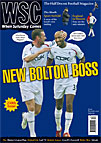 Referees get official help. Steve Menary reports
Referees get official help. Steve Menary reports
The idea of clubs even at semi-professional level – let alone in the Premier League – having to find their own referee for a home game is hard to imagine. At parks level, however, many clubs do that every week, often prompting disputes about the officials’ impartiality. The reason that referees are in such short supply is because hundreds have drifted out of the game due to the poor behaviour of players and spectators. That is why the Football Association launched its initiative to improve respect for referees, which begins in earnest in January 2008.
The County FAs of East Riding, Gloucestershire, Middlesex, Cheshire Cambridgeshire, Berks & Bucks, Staffordshire and Northamptonshire will run three different pilot schemes. FA chief executive Brian Barwick explains: “One [is] where only the captain can approach the referee. Two [is] roped-off areas so over-indulgent and abusive parents and spectators can’t get at them. And number three is a memorandum of understanding. Everyone signs up to a standard of behaviour. If it’s breached then you can’t go out and play. It’s not going to change overnight but we’re working very hard at it.” The initiative could go further. At an FA roadshow at The Hawthorns in October, Barwick outlined the scheme and cited the example of rugby union, where referees in televised matches are equipped with microphones, as a “marker” for football.
Barnet have shown that such ideas can work. They had players sent off in three consecutive League matches in August and collected seven yellow cards. “Our disciplinary record at the start of the season was a fraction off ideal,” admits David Bloomfield, the club’s communications manager, in a nice piece of understatement. “Red cards and cautions put people out for a few games and we’ve not got the largest squad.” In early September, Barnet winger Adam Birchall had what the club describes as “a ‘eureka!’ moment”. Birchall suggested that Barnet’s growing number of red and yellow cards could be cut down by allowing only the captain to speak to the referee.
Club captain Lee Harrison and manager Paul Fairclough agreed to give it a try. Team captain Ishmael Yakubu was also enthusiastic, although injury meant his deputy, Sagi Burton, became the team’s mouthpiece.
Whether Birchall or the FA had the idea first remains unclear, but Barwick has agreed to come to Underhill to see it in action. The FA have not had contact with other professional clubs about this initiative, but could a larger, division-wide trial be feasible? Kevin Blackwell, the former Leeds manager now in charge at Luton Town, is not so sure. He says: “There are major problems with discipline but I don’t think this will work. Sometimes things are said in the heat of the moment. It’s a contact sport and people have to be able to cope with a bit of verbals and you’re not going to go chasing across to your captain. If it’s at the ref, give them a red card.”
Blackwell is probably not alone among professional managers in being wary, but he and his peers could be won over by the evidence at Barnet. Since starting the initiative, the club have had one player sent off, average a yellow card every other game, are in the race for promotion and Fairclough was named manager of the month in September. Still, not every team can be doing well in the league at once and if players aren’t getting booked for dissent, managers will have to find new things to fine them for.